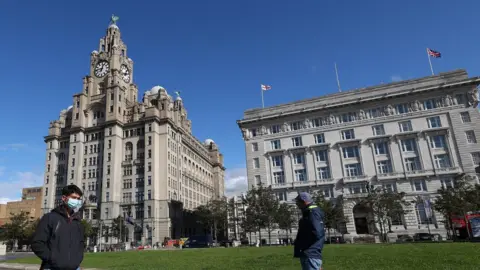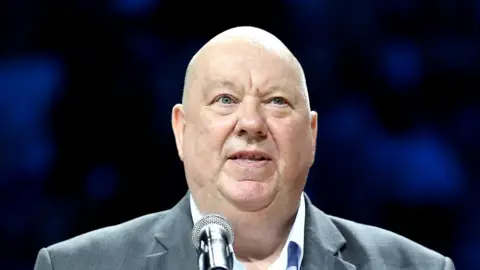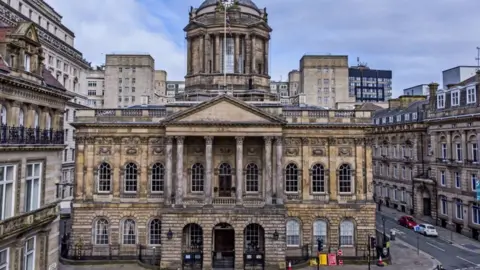Liverpool City Council: What does the future hold?
 PA Media
PA MediaCommissioners have been appointed by the government to oversee some of Liverpool City Council's activities.
The Labour-run authority has been under intense scrutiny since five men, including the city's then mayor Joe Anderson, were arrested by police investigating allegations relating to building and development contracts in the city.
Mr Anderson, 63, denies any wrongdoing and has not been charged with any offences.
Following the allegations, the government announced an investigation into the council's planning, highways, regeneration and property management departments.
Local Government Secretary Robert Jenrick is using his powers to install the commissioners, who will be tasked with overseeing an improvement plan over the next three years.
The local authority has 10 days in which to respond.
How does Liverpool City Council operate?
Local authorities are democratically elected bodies which, while independent from Westminster, are subject to external scrutiny from government bodies.
In 2012, Liverpool was one of 11 cities in England to introduce a directly elected mayor model.
Greg Clark, the communities minister at the time, said the elected mayors would give "visible leadership" and increase prosperity.
The mayor is elected for a four-year period and is responsible for the day-to-day running of the council. Last May's elections were postponed by 12 months due to the Covid-19 pandemic.
If there is evidence that a council is failing to carry out its duties, the government has the power to appoint an inspector to scrutinise the council and intervene if necessary.
What is the current situation in Liverpool?
Joe Anderson became Liverpool's first directly elected mayor in May 2012 after serving as the council leader. He was re-elected in 2016.
In December, inspectors were sent in by Mr Jenrick following the arrest of five men, including Mr Anderson.
It follows an investigation by Merseyside Police into building and development contracts in the city.
 PA Media
PA MediaMr Anderson stepped aside from his mayoral duties pending the outcome of the investigation but has since told The Telegraph that he is taking legal action, arguing his arrest was unlawful. He is also taking legal action against the council.
The five suspects - including Mr Anderson - were originally released on police bail.
But an application by Merseyside Police to extend their bail has now been withdrawn as it was deemed "no longer necessary and proportionate".
The investigation continues and all suspects remain under investigation, the force said.
News of the bail changes emerged after Liverpool City Council dismissed its director of regeneration with immediate effect.
Nick Kavanagh was arrested in 2019 as part of the police probe.
In a statement released to the Liverpool Echo, Mr Kavanagh, who has not been charged and denies wrongdoing, said he would "fight to defend" his innocence.

Analysis
By Claire Hamilton, BBC Merseyside political reporter
The last time Liverpool was mentioned by a Secretary in State in Parliament, it was to praise its mass coronavirus testing programme back in November.
Now the city has been highlighted in the Commons for very different reasons.
There hasn't been a Conservative councillor elected in Liverpool for decades.
It's an understatement to say that the idea of a Conservative government intervening in the running of the Labour-controlled council has gone down badly with many in the city.
Communities Secretary Robert Jenrick said in parliament that the inspector's report identifies "multiple apparent failures" by Liverpool City Council.
The fact that local elections are only weeks away accelerates opposition parties' criticisms of the Labour administration.
It's going to be a bumpy few days ahead.

What action has been taken?
The decision has been taken to appoint commissioners to oversee "certain and limited functions" of the council for at least three years.
It means that the planning, regeneration, highways and property management departments will be taken under independent control.
The commissioners will be civil servants described as "of the highest possible standing".
The council will, under the oversight of the commissioners, "prepare and implement an improvement plan".
There will be checks on progress at six and twelve-month intervals.
Mr Jenrick also said he expects to change the electoral cycle in the city.
From 2023, instead of councillors being elected in thirds, there will be "all-out" election with all councillors elected at the same time every four years.
He also said he plans to reduce the number of councillors in each ward to one rather than three.
This will be subject to consultation.
What does the report say?
Mr Jenrick said it found the council had a "dysfunctional" culture and that public spending had been put at risk.
He said the council had "consistently failed to meet its statutory and managerial responsibilities and that the pervasive culture appeared to be rule avoidance".
There had been a "serious breakdown of governance" with a worrying lack of record-keeping across planning and regeneration, he said.
He said changes need to be "radical" and "delivered at pace".
He added the report found "an overall environment of intimidation described as one in which the only way to survive was to do what was requested without asking too many questions or applying normal professional standards".
What will happen to the elections in May?
The elections for a new mayor and for councillors will still go ahead in May.
The following candidates are so far in the running to become the next mayor of Liverpool.
- Richard Kemp - Liberal Democrats
- Tom Crone - Green Party
- Katie Burgess - Conservative
- Steve Radford - Liberal Party
- Roger Bannister - TUSC
- Stephen Yip - Independent
- The Labour Party's three original candidates were later told by the party not to apply and the process was reopened. Labour is due to announce its candidate on 29 March.
 PA Media
PA MediaWhat does the introduction of commissioners mean for local democracy?
Prof Jonathan Tonge, from the University of Liverpool's politics department, said Liverpool's voters in the upcoming elections might wonder "why bother?"
He said commissioners would have control of "key local functions" soon after the elections "unless the Secretary of State changes his mind" and "no-one will be electing the commissioners".
He added: "It is not a 'Tory takeover' though. The commissioners are apolitical experts in local government. Labour supports their intervention."
Prof Tonge said "a decade ago, the Conservative government placed great faith in directly elected mayors as city saviours. That looks hollow following this report".
He said those wanting "full restoration of local democracy face a long wait" by which point the council "will have been cut by up to two-thirds in size" but there is "no guarantee that will improve the standard of decision-making".
Where have commissioners been appointed in the past?
It is only the fifth time a "statutory intervention" has happened in England.
The government has previously appointed commissioners to oversee four councils - Doncaster, Tower Hamlets in London, Rotherham and Northamptonshire.
It intervened at Doncaster Council in 2010 after a report found it was not capable of making improvements after a series of crises.
Government-appointed commissioners took over some services at Tower Hamlets Council in 2014 after a report revealed a "culture of cronyism" in the London borough.
In 2015, Rotherham Council was put under government control after a report found 1,400 girls had been abused in the town.
Most recently, two government-appointed commissioners were sent in to oversee a financially troubled Northamptonshire County Council in 2018.

Why not follow BBC North West on Facebook, Twitter and Instagram? You can also send story ideas to [email protected]
